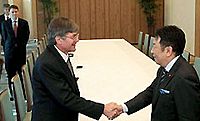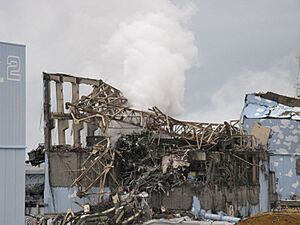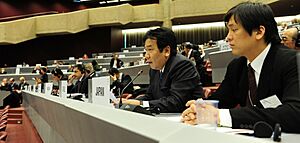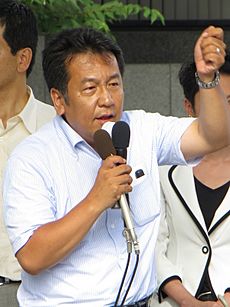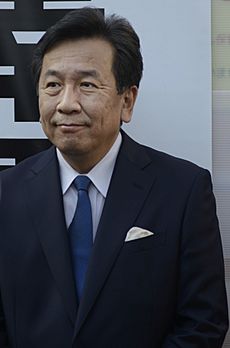Yukio Edano facts for kids
Quick facts for kids
Yukio Edano
|
|
|---|---|
|
枝野 幸男
|
|
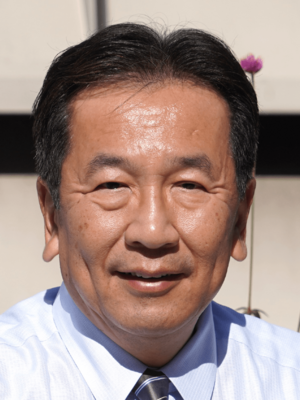
Edano in 2024
|
|
| Leader of the Constitutional Democratic Party | |
| In office 2 October 2017 – 12 November 2021 |
|
| Deputy | Akira Nagatsuma |
| Preceded by | Position established |
| Succeeded by | Kenta Izumi |
| Minister of Economy, Trade and Industry | |
| In office 12 September 2011 – 26 December 2012 |
|
| Prime Minister | Yoshihiko Noda |
| Preceded by | Yoshio Hachiro |
| Succeeded by | Toshimitsu Motegi |
| Chief Cabinet Secretary | |
| In office 4 January 2011 – 2 September 2011 |
|
| Prime Minister | Naoto Kan |
| Preceded by | Yoshito Sengoku |
| Succeeded by | Osamu Fujimura |
| Minister of State for Government Revitalisation | |
| In office 27 June 2011 – 2 September 2011 |
|
| Prime Minister | Naoto Kan |
| Preceded by | Renhō |
| Succeeded by | Renhō |
| In office 10 February 2010 – 8 June 2010 |
|
| Prime Minister | Yukio Hatoyama |
| Preceded by | Yoshito Sengoku |
| Succeeded by | Renhō |
| Minister of State for Okinawa and Northern Territories Affairs | |
| In office 14 January 2011 – 2 September 2011 |
|
| Prime Minister | Naoto Kan |
| Preceded by | Sumio Mabuchi |
| Succeeded by | Tatsuo Kawabata |
| Minister of Foreign Affairs | |
| In office 7 March 2011 – 9 March 2011 |
|
| Prime Minister | Naoto Kan |
| Preceded by | Seiji Maehara |
| Succeeded by | Takeaki Matsumoto |
| Member of the House of Representatives | |
| Assumed office 19 July 1993 |
|
| Preceded by | Multi-member district |
| Constituency |
|
| Personal details | |
| Born | 31 May 1964 Utsunomiya, Japan |
| Political party | CDP (since 2017) |
| Other political affiliations |
JNP (1992–1994) NPS (1994–1998) DPJ (1998–2016) DP (2016–2017) |
| Spouse | Kazuko Edano |
| Children | 2 |
| Alma mater | Tohoku University |
Yukio Edano (枝野 幸男, Edano Yukio, born 31 May 1964) is a Japanese politician. He was the leader of the Constitutional Democratic Party of Japan (CDP) from 2017 to 2021.
He has held many important jobs in the Japanese government. These include being the Chief Cabinet Secretary and the Minister of Economy, Trade and Industry. He also led the Democratic Party's policy research group.
Edano was first elected to Japan's parliament in 1993. He joined the Japan New Party. He served in several governments before joining the Democratic Party in 1998. He played a big role in Japan's response to the 2011 Tōhoku earthquake and tsunami.
After his party lost the 2012 election, he continued to serve in parliament. In 2017, he formed the Constitutional Democratic Party of Japan. This happened after some members were not allowed to join another new party. His new party surprisingly came in second place in the 2017 election. He resigned as party leader after the 2021 election.
Contents
Early Life and Education
Yukio Edano was born in Utsunomiya, Japan, on May 31, 1964. His father admired a famous Japanese politician named Yukio Ozaki, and that's who Edano was named after.
He went to elementary and junior high school in Utsunomiya. He was even the student council president at both schools. Edano later studied law at Tohoku University. He passed the difficult Japanese bar examination when he was 24 years old. This allowed him to become a lawyer.
Start of Political Career
In 1992, a new political party called the Japan New Party was started. Edano, who was working as a lawyer in Tokyo, was inspired by the party's ideas. He was interested in politics from a young age.
The new party looked for people to run for the Japanese House of Representatives. Edano applied and was chosen to be a candidate for the Saitama 5th district. He didn't have much money or political experience. He gave speeches on the side of the road in the mornings. He came in second place in the election but was still elected to parliament.
Early Government Roles
After the election, a new government was formed, led by Morihiro Hosokawa. This was the first time in many years that the main party, the LDP, was not part of the government. Edano worked on a committee that helped create a law about product safety.
The Hosokawa government ended early due to a money scandal. Edano then joined another party called the New Party Sakigake. He worked on government reform, suggesting ways to improve how civil servants were hired. He also led a group of young politicians who wanted to join the new Democratic Party.
Role in the HIV Scandal
Edano played an important part in investigating the HIV tainted blood scandal. This started in 1995. He believed the government was responsible for the issue.
He helped Naoto Kan in his efforts to solve the problem. This led to an investigation into why contaminated products were still used. Edano was there when the ministry apologized in February 1996. He also questioned a former head of the AIDS research team.
Joining the Democratic Party
In 1996, Edano helped form the Democratic Party. He ran for election again but lost his district seat. However, he was still elected to the House through a different system.
In 1998, several parties, including the Democratic Party, joined together. They formed the Democratic Party of Japan (DPJ). This was done to create a stronger opposition to the ruling party. Edano became a vice-chairman in the party's policy group. He also helped pass a law about financial reconstruction.
He held various roles within the DPJ. He became the Acting Chairman of the Policy Research Group. He also served as a "Deputy Chief Cabinet Secretary" in the party's shadow government. In 2000, he won back his district seat in Saitama.
He continued to be re-elected in his home district in 2003 and 2005. In 2009, he was re-elected by a large margin. This was when the Democratic Party won a major victory and came to power.
Serving in Government
Hatoyama and Kan Cabinets
When the Hatoyama Cabinet started in 2009, many thought Edano would become a minister. He was instead appointed to help coordinate the Administrative Reform Council. This group worked to improve government operations.
In 2010, Edano became the secretary-general of the Democratic Party. He led the party through an election for the House of Councilors. In September, he resigned from this role.
In January 2011, Edano was appointed as the Chief Cabinet Secretary. This is a very important role, like a top government spokesperson. He was also the Minister of State for Okinawa and Northern Territories Affairs. For a short time in March, he even served as the interim Foreign Minister.
Tohoku Earthquake and Fukushima
On March 11, 2011, a powerful earthquake and tsunami hit Tohoku, Japan. This also caused a serious nuclear accident at the Fukushima Daiichi Nuclear Power Plant. Edano became the government's main spokesperson during this crisis. He gave daily updates on the recovery efforts.
He worked hard to centralize information about the disasters. He ordered radiation measurements around the nuclear plant. He also helped decide on evacuation areas for residents.
Noda Cabinet
After Naoto Kan resigned, the Noda Cabinet was formed. Edano resigned from his previous roles. Ten days later, he was appointed as the Minister of Economy, Trade and Industry. He also became the Special Minister for Compensation of Nuclear Damage.
In 2012, he played a key role in deciding to restart some nuclear power plants. These plants had been shut down after the Fukushima accident. He explained that restarting them was needed to avoid power shortages. He also approved the restart of construction for other nuclear power plants.
After Government Service
Continuing in Parliament
In the 2012 election, the Democratic Party of Japan lost many seats. However, Edano managed to keep his seat in Saitama. He was one of the few DPJ members to hold a single-seat district in that area.
He became the secretary-general of the DPJ in September 2014. He kept his seat in the 2014 election, though by a smaller margin.
In March 2016, the DPJ merged with other parties to form the Democratic Party. Edano remained the secretary-general of this new party.
Constitutional Democratic Party
Forming a New Party
In September 2017, a new general election was called. The leader of the Democratic Party suggested joining a new party called Kibō no Tō (Party of Hope). However, the leader of Kibō no Tō said she would not accept liberal members of the Democratic Party.
Because of this, Edano decided to form a new party for these liberal politicians. On October 1, 2017, he gave a speech to supporters. He said he would "protect and fight for constitutionalism, freedom of the press, freedom of expression, and information disclosure."
The next day, Edano announced the formation of the Constitutional Democratic Party of Japan (CDP). He said the party would "put a stop to the Abe administration's rampage." The JCP showed its support by withdrawing its candidate from Edano's district.
Leadership and Elections
In the 2017 general election, the CDP, along with its allies, surprised many by coming in second place. They won more seats than Kibō no Tō. Edano won his own district by a much larger margin than before.
On September 14, 2020, the CDP merged with most of the Democratic Party for the People and parts of the SDP. This created a larger, more unified opposition group. Edano was re-elected as the leader of this new, larger CDP.
In the 2021 general election, the CDP increased its total number of seats. However, because of the merger, the party actually had fewer seats than before the merger. Edano won his district by a very small margin. After the election, on November 2, he announced he would resign as party leader. He said the party needed a "new system" to prepare for future elections. His resignation was accepted on November 12.
In 2023, there were rumors that he might try to become the leader of the CDP again. He released an updated version of his "Edano Vision," which is a plan he published when he was party leader.
Political Views
Edano has said he sees himself as both liberal and conservative. He believes these ideas can go together. He supports allowing married couples to keep separate surnames.
Family
Yukio Edano is married and has two twin sons.
See also
 In Spanish: Yukio Edano para niños
In Spanish: Yukio Edano para niños
 | James B. Knighten |
 | Azellia White |
 | Willa Brown |


